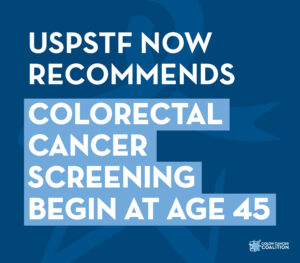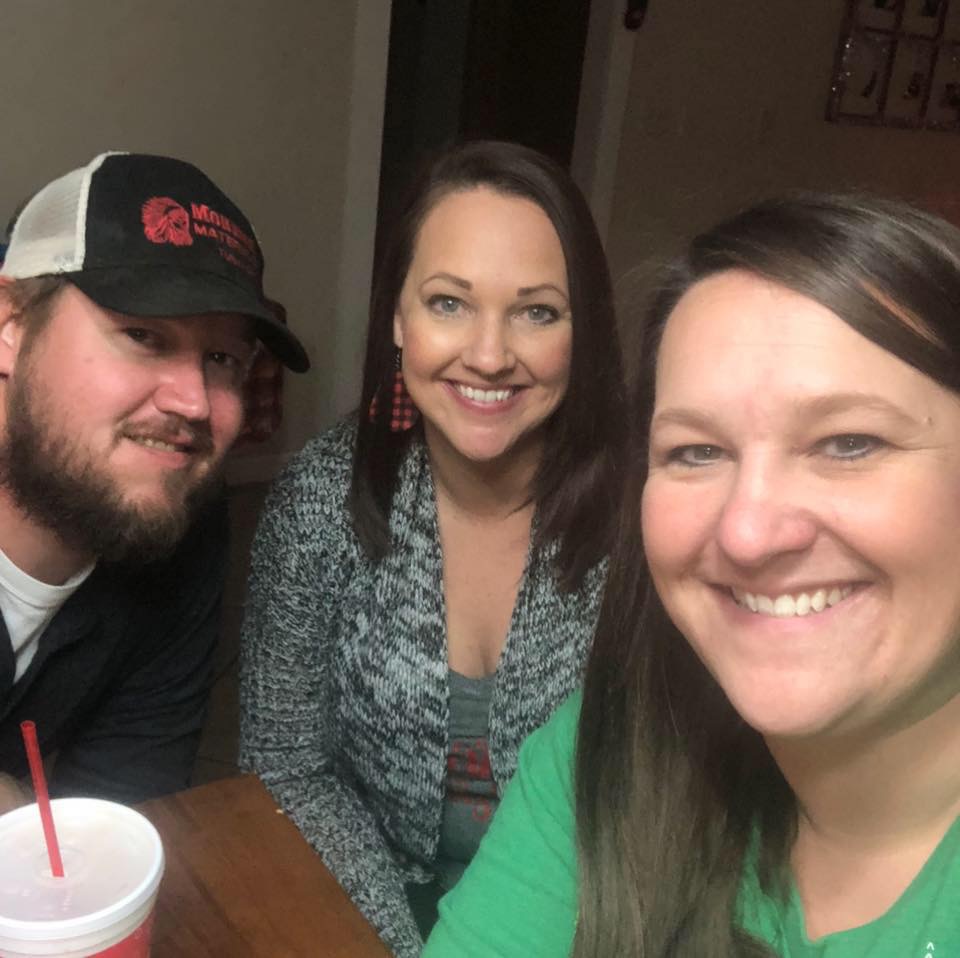
The Colon Cancer Coalition applauds the United States Preventive Services Task Force’s (USPSTF) move today making colorectal cancer screening at age 45 a “B” recommendation and aligning with the American Cancer Society’s 2018 recommendation. This move will require most colorectal cancer screening be covered by insurance with no copay for 22 million people between the ages of 45 and 49.  Approximately 18,000 adults are diagnosed with colorectal cancer under the age of 50 each year in the United States, 75% of them between the ages of 45-49.
Approximately 18,000 adults are diagnosed with colorectal cancer under the age of 50 each year in the United States, 75% of them between the ages of 45-49.
Colorectal cancer screening at age 45 means earlier detection of cancer in thousands of individuals as well as prevention of colorectal cancer in countless others. This reduced screening age will benefit the thousands of individuals between 45 and 49 who have been unable to afford or access a colorectal cancer screening because the tests were not covered by insurance.
“The decision to lower the screening guidelines to age 45 is wonderful news and will make  screening on time more accessible for many Americans,” says Chris Evans, president of the Colon Cancer Coalition. “As we see colorectal cancer rates rise in younger adults, screening at 45 will help find cancer in earlier stages when it is easier to treat. We must also recognize, however, that there are still many young people who will not be recommended for screening under this new guidance. The work must continue to educate the public about the signs and symptoms as well as the importance of understanding family history for screening to begin on time for more Americans.”
screening on time more accessible for many Americans,” says Chris Evans, president of the Colon Cancer Coalition. “As we see colorectal cancer rates rise in younger adults, screening at 45 will help find cancer in earlier stages when it is easier to treat. We must also recognize, however, that there are still many young people who will not be recommended for screening under this new guidance. The work must continue to educate the public about the signs and symptoms as well as the importance of understanding family history for screening to begin on time for more Americans.”
The great news is that millions of additional Americans have become eligible for colorectal cancer screening. This also means that 22 million Americans will now be seeking care in an already strapped health care system. Advocacy groups and others in the colorectal cancer community must continue to address screening disparities for black and brown Americans to be sure care remains available. We must also continue to address the 49% of Americans ages 50-54 who have not yet been screened for colorectal cancer. In addition, 2021 adds additional pressure with the pandemic waning and the need to address the precipitous drop in colorectal cancer screening rates in 2020.
Challenges are ahead, but this change in recommendation from the USPSTF means lifesaving screening is available. There are many options available to eligible individuals, including visual screening methods like colonoscopy or CT colonography (virtual colonoscopy), and non-invasive, stool-based screening methods like FIT, FOBT, or DNA-FIT (Cologuard®). It is time for all Americans due for screening to make and keep their appointments.
Colorectal Cancer Screening Options Young Onset Colorectal Cancer Colorectal Cancer Symptoms


It is great news that it has been lowered but, for a Grieving Mother/Family who lost one of our twin daughters to Colon Cancer at age 34 last March 2020. We truly feel it should be even lower than 45. Why can’t it be lowered to 20 or 25 because of so many Young Adults getting this disease. (not certain what you consider Young Adults). I am now advocating and speeding the word about this dreaded disease. I am hearing more and more everyday and it truly heart breaking.
Hi Gwendolyn, we hear you and grieve with you and so many others who have lost loved ones to this disease, especially heartbreaking are those who lost children and family members who had so much life ahead of them. Personally, I have lost too many to count. We are celebrating the decision to lower the screening age because it will have a lasting impact on so many, but agree the work needs to continue for outreach and education about the many many young people under 45 who are still affected. This work isn’t done because of this announcement. It continues because there are still so many others.